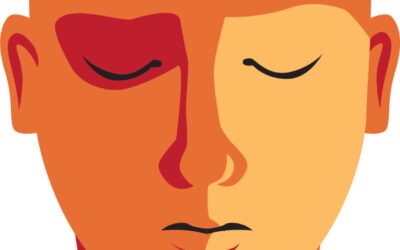
WHAT IS OCD?
OCD or obsessive-compulsive disorder basically consists of two major components, obsessive thoughts or fears, and compulsive behaviors. As the name suggests, it is a chronic condition where an individual suffers from persistent unwanted thoughts, after which they indulge in compulsive behavior patterns to avoid the particular thought. It becomes a concern when this cycle of constant obsessions and compulsions starts to negatively affect and hamper the individual’s daily life.
The most common example of such a condition is fear of germs, which makes you sensitive to touching random surfaces and other things. The compulsive behavior attached to this is constantly washing your hands which not only takes up a lot of your time but also results in skin conditions. It may sound trivial, but the impact it has on a person’s daily functioning is unimaginable.
You might attempt to get rid of these thoughts or obsessions, which further leads to more anxiety and ultimately forces you to perform the compulsive behaviors again. Therefore, it drags you into a spiral you cannot get out of, not without the right kind of help. Additionally, before getting help, you need to understand the symptoms in detail and identify whether it has become a concern for you or your close ones.
SYMPTOMS OF OBSESSIVE-COMPULSIVE DISORDER
As mentioned in the beginning, OCD contains two components, and thus entails two different sets of symptoms. You can notice either obsessions or compulsions or both of them together. Even subtle symptoms of either of these can significantly occupy your mind to an extent that you could not pay attention to any task in your personal and professional life. In any case, it is important to mindfully recognize the symptoms in order to take the necessary steps to overcome it.
Obsession Symptoms
- Fear of germs or dirt
- Fear of illness or physical ailments
- Constant sexual thoughts
- Fear of harming oneself or others; violent thoughts
- Unexplainable urge to keep things organized or symmetrical
- Fear of losing your loved ones
Apart from these common symptoms, obsessions or obsessive thoughts can consist of anything that persistently occupies your mind and makes you perform behaviors in order to suppress the thoughts and the anxiety attached to them.
Compulsion Symptoms
- Repeatedly washing or cleaning your hands, legs, etc
- Constant checkups and tests to eradicate any sign of illness
- Keeping everything symmetrical and organized even in unusual settings
- Counting or paraphrasing repetitively
- Doing any activity, a set number of times
- Calling and texting loved ones for an update on their well being
- Hoarding things and not being able to dispose them off for long durations
These are the most common symptoms of compulsive behaviors, however, any pattern of behaviors that demands to be performed over and over again qualifies as a compulsion and needs to be taken care of.
Now that you have an idea of what the symptoms of OCD may look like, you can identify them within yourself or your close ones by answering a few necessary questions including;
- how many hours of the day does your obsessions take up?
- what do you do to suppress these obsessive thoughts and how often?
- does it help you lower your anxiety?
- how does it hamper your day-to-day functioning?
If you find yourself occupied with these symptoms in a manner that it starts to affect your well-being and daily functioning, it might be time to consult a qualified mental health professional who can help you address these concerns in a more categorized manner. In the next section, we will discuss the treatment options for obsessive-compulsive disorder, based on the type and severity of the condition.
TREATMENT FOR OCD
There have been many successful combinations of treatment for treating OCD, that vary depending on the severity of the issue. Most people recover from their concerns with little help that combines a mixture of therapies as well as medications. Although some psychological therapies have proven to be favorable in the treatment process, medications are given in some cases where it is required to relieve the person from acute anxiety. We will discuss these remedies in detail.
- Cognitive behavioral therapy – Cognitive-behavior therapy is a sort of treatment that aids patients in managing and altering unhelpful ideas, actions, and feelings. It has been seen to be very helpful in treating these conditions by addressing underlying thoughts that start the cycle.
- Exposure and Ritual Prevention therapy– ERP is a specific subset of CBT for obsessive-compulsive disorder (OCD) that aims to break two different kinds of connections that develop in OCD. The first one is the connection between items, situations, or thoughts and distressing sensations that arise as a result. The second link is between the compulsive or ritualistic activity and diminishing the stress and anxiety attached to it.
MEDICATION
Although there is a medically-approved list of drugs that are used in the treatment of OCD, you should typically start with therapy and then under the guidance of a qualified professional, move on to medications when necessary.
SELF-HELP TIPS FOR OCD
Seeking professional help is undoubted, the best course of action in this scenario. However, that does not mean that you can do nothing to make the journey a little easier for yourself. We are listing a few easy self-help tips that you can do yourself in your own time to relax and take care of your mind.
- Managing anxiety– Learning coping mechanisms for anxiety, such as calculating the likelihood of what you’re worried about will actually occur and figuring out how to handle the worst-case situation should it occur, is an important self-help tactic. You can indulge in any activity that calms your mind or catch up on a hobby.
- Practice relaxation techniques– Learning and using a variety of relaxation techniques is one of the best ways to improve your OCD self-help abilities because stress and worry are significant OCD symptom triggers. Any OCD self-help plan that incorporates deep breathing, mindfulness meditation, and progressive muscle relaxation can be quite successful.
- Exercise– The majority of us are aware of the numerous physical advantages of aerobic exercise, including lowering cholesterol levels, a reduced risk of heart disease, and a decreased chance of diabetes. Running, for example, may be a useful OCD self-help technique for lowering the frequency and severity of OCD symptoms, according to mounting research.
- Avoid caffeine– The neurological system is stimulated by caffeine, which may raise the likelihood of anxiety. As a result, consumption of caffeine should be restricted to those who have OCD. After consuming caffeine, you could feel calm, but after the impact wears off, your odds of developing anxiety rise.
- Check your sleep schedule– Getting enough sleep is important for everyone’s health, whether or not you have a problem. Having the appropriate sleep schedule and adhering to it daily are essential if you have OCD. You may have experienced sleepless nights due to OCD, but scheduling your sleep is necessary for self-care OCD control.
Eventually, no matter how difficult the journey of overcoming OCD might get, you have to learn to celebrate small victories and achievements throughout the process. Progress does not happen overnight and it takes patience and baby steps to finally rid yourself of these thoughts. Having said this, consulting the correct mental health professional to guide you along the journey and celebrate your victories without overwhelming yourself, is of utmost importance.
7 Cognitive Distortion & Way to deal with them
Cognitive distortions or faulty thinking patterns are unnecessary or irrational thought habits. These negative thought patterns can contribute to issues like anxiety, sadness, and substance abuse as well as decrease your motivation and self-esteem. Cognitive...
7 Red Flags you have been Gaslighted
The phrase "gaslighting" originates from a 1938 play by Patrick Hamilton called "Angel Street" in America, which Alfred Hitchcock later turned into the movie "Gas Light." In the thriller movie, a cunning spouse tries to make his wife believe she is going crazy by...
Heal Your Trauma Today
Psychological trauma consists of extremely stressful circumstances that destroyed your sense of safety and left you feeling helpless in a hazardous environment. You may struggle with troubling feelings, memories, and anxiety as a result of psychological trauma. You...
How to deal with Irrational Fears
Some individuals may find the word "irrational" insulting. In light of the fact that the fear seems to be extremely real, there may possibly be a valid basis for it. But depending on how it controls your life, even a reasonable fear might be irrational. Most people...
Intrusive Thoughts – Knowing the Causes, Types, and Treatment
What are intrusive thoughts? Ever been in a normal social setting like your classroom or office, and suddenly an unwanted thought or image pops up that makes no sense? In most cases, you overlook these thoughts and continue with your day, but some of them become...
5 Best Stress Management Techniques
Do you feel stressed in your life? If yes then you are at the right place. This blog will help you understand and learn effective techniques to cope up with stress. Stress is a problem that many people struggle with on a day-to-day basis. People frequently exhibit...






